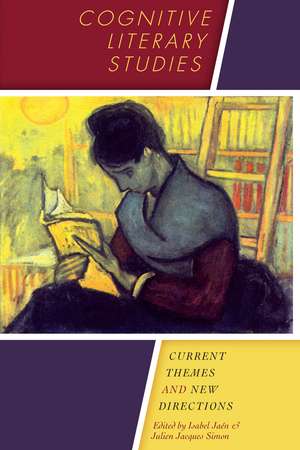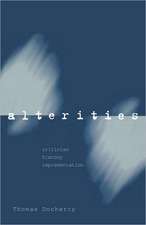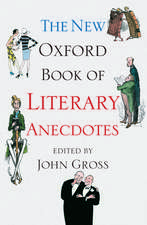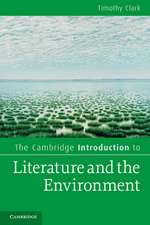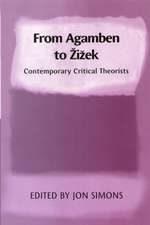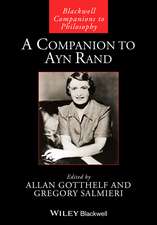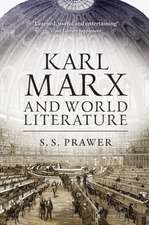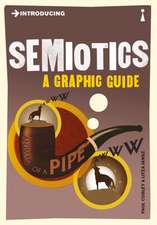Cognitive Literary Studies: Current Themes and New Directions: Cognitive Approaches to Literature and Culture Series
Editat de Isabel Jaén, Julien Jacques Simonen Limba Engleză Paperback – iun 2012
Beginning with an overview of the evolution of literary studies, the editors trace the recent shift from poststructuralism and its relativism to a growing interdisciplinary interest in the empirical realm of neuroscience. In illuminating essays that examine the cognitive processes at work when we experience fictional worlds, with findings on the brain’s creativity sites, this collection also explores the impact of literature on self and society, ending with a discussion on the present and future of the psychology of fiction. Contributors include Literature and the Brain author Norman N. Holland, on the neuroscience of metafiction reflected in Don Quixote; clinical psychologist Aaron Mishara on the neurology of self in the hypnagogic (between waking and sleeping) state and its manifestations in Kafka’s stories; and literary scholar Brad Sullivan’s exploration of Romantic poetry as a didactic tool, applying David Hartley’s eighteenth-century theories of sensory experience.
Preț: 225.50 lei
Nou
Puncte Express: 338
Preț estimativ în valută:
43.15€ • 45.17$ • 35.70£
43.15€ • 45.17$ • 35.70£
Carte tipărită la comandă
Livrare economică 05-19 aprilie
Preluare comenzi: 021 569.72.76
Specificații
ISBN-13: 9780292754423
ISBN-10: 0292754426
Pagini: 279
Ilustrații: 1 line drawing, 2 charts
Dimensiuni: 152 x 229 x 19 mm
Greutate: 0.45 kg
Editura: University of Texas Press
Colecția University of Texas Press
Seria Cognitive Approaches to Literature and Culture Series
ISBN-10: 0292754426
Pagini: 279
Ilustrații: 1 line drawing, 2 charts
Dimensiuni: 152 x 229 x 19 mm
Greutate: 0.45 kg
Editura: University of Texas Press
Colecția University of Texas Press
Seria Cognitive Approaches to Literature and Culture Series
Notă biografică
Isabel Jaén is Assistant Professor of Spanish at Portland State University. Julien Jacques Simon is Associate Professor of Spanish and French at Indiana University East. They are executive members of the Modern Language Association Cognitive Approaches to Literature discussion group and cofounded the Literary Theory, Cognition, and the Brain working group at Yale University.
Cuprins
- Foreword (F. Elizabeth Hart)
- Introduction (Isabel Jaén and Julien J. Simon)
- Section I: Cognitive Literary Studies Today
- 1. An Overview of Recent Developments in Cognitive Literary Studies (Isabel Jaén and Julien J. Simon)
- Section II: The Cognitive Sciences and Literary Theory in Dialogue
- 2. Why Literature Is Necessary, and Not Just Nice (Richard J. Gerrig)
- 3. Theory of Mind in Reconciling the Split Object of Narrative Comprehension (Joseph A. Murphy)
- Section III: Neurological Approaches to Literature
- 4. Don Quixote and the Neuroscience of Metafiction (Norman N. Holland)
- 5. The Mourning Brain: Attachment, Anticipation, and Hamlet’s Unmanly Grief (Patrick Colm Hogan)
- 6. The Literary Neuroscience of Kafka’s Hypnagogic Hallucinations: How Literature Informs the Neuroscientific Study of Self and Its Disorders (Aaron L. Mishara)
- Section IV: Language, Literature, and Mind Processes
- 7. Blending and Beyond: Form and Feeling in Poetic Iconicity (Margaret H. Freeman)
- 8. “A sermon in the midst of a smutty tale”: Blending in Genres of Speech, Writing, and Literature (Michael Sinding)
- 9. Counting in Metrical Verse (Nigel Fabb and Morris Halle)
- 10. Fictive Motion and Perspectival Construal in the Lyric (Claiborne Rice)
- Section V: Literature and Human Development
- 11. Education by Poetry: Hartley’s Theory of Mind as a Context for Understanding Early Romantic Poetic Strategies (Brad Sullivan)
- 12. Leafy Houses and Acorn Kisses: J. M. Barrie’s Neverland Playground (Glenda Sacks)
- Postscript: The Psychology of Fiction: Present and Future (Keith Oatley, Raymond A. Mar, and Maja Djikic)
- Contributors
- Index
Descriere
A dynamic array of top scholars from the sciences and the humanities present new perspectives on the mind and its literary quests, ranging from Hamlet to Kafka to Barrie’s Peter Pan.
